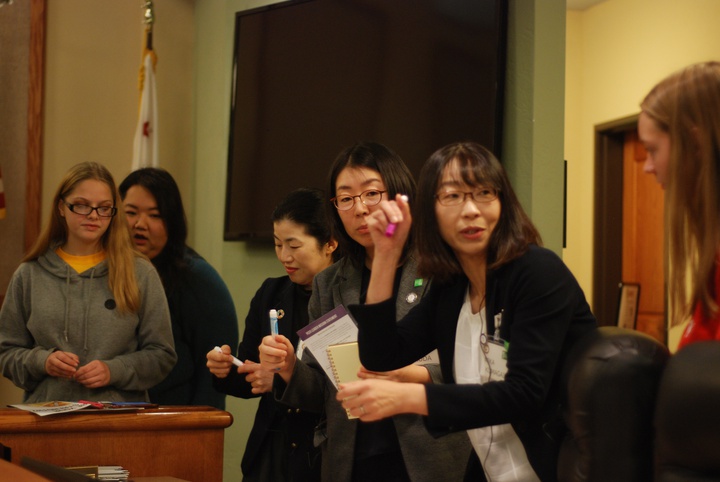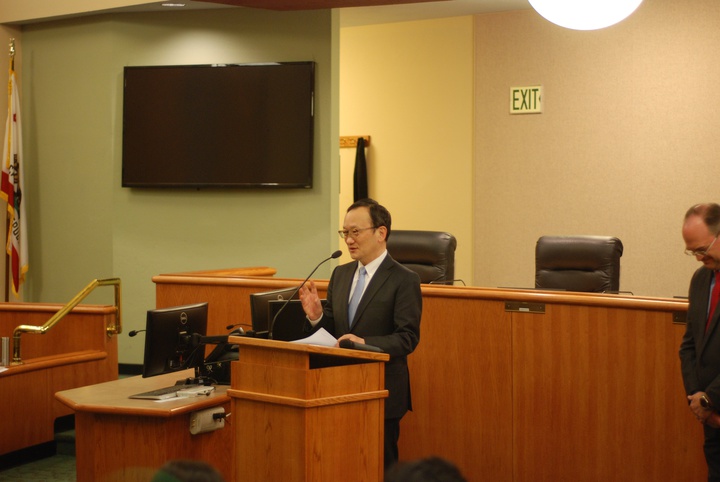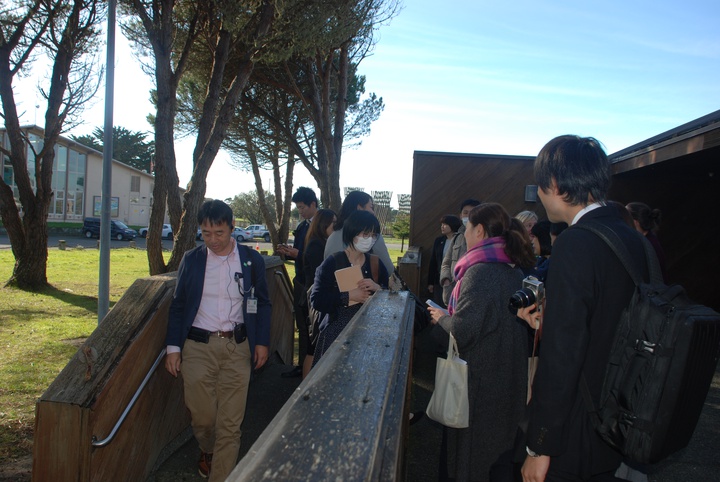Jessica Cejnar / Monday, Dec. 9, 2019 @ 5:07 p.m. / Community, Our Culture
'We Empower Ourselves, We Empower Survivors': Resiliency, Empowerment Focus Of Delegation's First Day In Crescent City

Students from Sunset High School led the delegates from Rikuzentakata in an exercise Monday, asking them to draw the things that gives them strength. Photo: Jessica Cejnar
While the younger delegation experienced an American high school Monday, their adult counterparts explored what resiliency and women’s empowerment mean.
Angela Glore, director of the local First 5 chapter, focused on two items important to both Del Norte County and Rikuzentakata, Japan. The first was Kamome, Takata High School’s fishing vessel swept away by the March 2011 tsunami to wind up on the beach south of Crescent City two years later. The second was a tree.
Glore pointed out that a Google search of the term resiliency will often bring up images of trees bending in the wind. Rikuzentakata has a tree that, though it’s no longer alive, has come to symbolize hope because it’s the only one of what was once a forest of thousands to still stand.
Glore drew a parallel between Rikuzentakata’s Miracle Pine and a redwood forest’s nurse trees. Lichens, huckleberries, ferns and small trees will sprout and grow on the trunk of a fallen tree, she said.
“Its death sets the stage for new life and creates an entire community of plants,” she said. “In a similar way each generation of empowered women sets the stage for the next generation to achieve greater empowerment. The good news is that we don’t have to die to support the larger community, we simply have to advocate for better policies and support the dreams of young women who are following in our footsteps.”
The delegation from Rikuzentakata, including some 35 adults and five students, spent their first full day getting to know Crescent City. For the teens, this included experiencing Del Note Unified School District’s career and technical education program, meeting with local leaders and visiting local institutions of higher education, said DNUSD Superintendent Jeff Harris.

Consul General Tomochika Uyama visited Crescent City from San Francisco and commended the relationship that continues to grow between Del Norte and Rikuzentakata. Photo: Jessica Cejnar
“For some of them, the most fun will also be they will be working with NBC for an Olympics special,” Harris said.
Before he introduced the delegation to Briannon Fraley, self governance officer for the Tolowa Dee-ni’ Nation, and Amy Cordalis, the Yurok Tribe’s general counsel, Harris turned the conversation over to Consul General Tomochika Uyama, who visited Crescent City from the Consulate General of Japan in San Francisco.
There have been more than 100 sister and friendship cities between communities in California and Japan since 1957, said Consul General Tomochika Uyama, who visited Crescent City from the Consulate General of Japan in San Francisco. Sixty-five such communities exist in Northern California, he said.
But, the relationship between Crescent City-Del Norte County and Rikuzentakata shows that longevity is not the only measure of quality, Uyama said. He commended the current cultural exchange’s focus of empowering women, inclusionary practices in schools and helping students living with trauma.
“Overcoming these challenges in both of your communities is crucial to the wellbeing and strength of your citizens and I find it highly motivating that all of you are here to learn from each other,” Uyama said.
Uyama described the relationship between Del Norte County and Rikuzentakata with the Japanese word for bridge — hashi. Others, including supervisors Chris Howard and Lori Cowan and Del Norte Unified School District Board President Frank Magarino said Kamome was the link that sparked the relationship between the two communities.
She symbolizes hope and is part of a story both communities can share with the world, Howard said.
“Kamome found our children for a reason,” he said, adding that the United Nations in July accepted Rikuzentakata as part of its list of sustainable cities.
Howard noted that the United Nations’ Sustainable Development Goals include addressing poverty, inequality and improving health and education.
“Kamome is our boat of hope and is our conversation to share with the world,” Howard said. “We will be that model for our future.”

Eri Suzuki, a reporter at the Tohkaishimpo newspaper, was among the delegates who arrived in Crescent City on Sunday. Photo: Jessica Cejnar
Briannon Fraley, self governance director for the Tolowa Dee-ni’ Nation, mentioned the trauma her people lived through and the woman she is today because of it.
“I’m a mother of four and I’m a survivor of a mass genocide,” she said. “I was thinking about trauma and how that changes who you are as a person and for me, if I didn’t experience historic traumas of genocide, then I wouldn’t be empowered to be the woman I am today to step into a leadership role.”
Fraley noted that the delegation from Rikuzentakata are picking up the pieces from a traumatic event that shook their community. It’s tragedy, Fraley said, that has propelled her people to take on different roles in their communities.
“Over time we empower ourselves, empower survivors,” she said. “Women were the glue that kept our families together.”
On Tuesday, delegates with the Women in Leadership group will head to Klamath for a panel discussion on women in business and will tour the Yurok Tribal offices. Delegates in the education group will be learning about trauma-informed practices at Margaret Keating Elementary School.
A Country Christmas Barbecue is planned for about 6 p.m. at the Crescent City Cultural Center before the delegation visits SeaQuake.
CLICK TO MANAGE